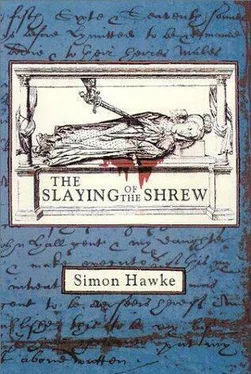Simon Hawke - The Slaying Of The Shrew
Здесь есть возможность читать онлайн «Simon Hawke - The Slaying Of The Shrew» весь текст электронной книги совершенно бесплатно (целиком полную версию без сокращений). В некоторых случаях можно слушать аудио, скачать через торрент в формате fb2 и присутствует краткое содержание. Жанр: Исторический детектив, на английском языке. Описание произведения, (предисловие) а так же отзывы посетителей доступны на портале библиотеки ЛибКат.
- Название:The Slaying Of The Shrew
- Автор:
- Жанр:
- Год:неизвестен
- ISBN:нет данных
- Рейтинг книги:5 / 5. Голосов: 1
-
Избранное:Добавить в избранное
- Отзывы:
-
Ваша оценка:
- 100
- 1
- 2
- 3
- 4
- 5
The Slaying Of The Shrew: краткое содержание, описание и аннотация
Предлагаем к чтению аннотацию, описание, краткое содержание или предисловие (зависит от того, что написал сам автор книги «The Slaying Of The Shrew»). Если вы не нашли необходимую информацию о книге — напишите в комментариях, мы постараемся отыскать её.
The Slaying Of The Shrew — читать онлайн бесплатно полную книгу (весь текст) целиком
Ниже представлен текст книги, разбитый по страницам. Система сохранения места последней прочитанной страницы, позволяет с удобством читать онлайн бесплатно книгу «The Slaying Of The Shrew», без необходимости каждый раз заново искать на чём Вы остановились. Поставьте закладку, и сможете в любой момент перейти на страницу, на которой закончили чтение.
Интервал:
Закладка:
A lively debate ensued among them about which play from their repertoire should be performed. Burbage was strongly of the opinion that Shakespeare’s new play, being a broad and rather bawdy comedy, would now be completely unsuitable for the occasion, and most of the players agreed. Kemp, of course, was the notable exception, for any comedy with a good deal of physicality and broad humor played mostly to his strengths as a dancer and a clown. John Fleming argued that a tragedy should be performed instead, for that would be more in keeping with the funereal occasion.
Part of the problem was that with Shakespeare still away in London, the man who would be most adept at making any last minute alterations in any of their plays to render them more suitable was gone, and they could not seem to agree on which play should be performed or whether any changes should be made. The one thing they all seemed able to agree on was that, under the circumstances, the success of their performance would almost certainly be doomed from the beginning. However, they could not very well refuse to perform. It simply was not done, aside from which, they had already been paid; their audience would be an illustrious one; and their host was a good friend of one of their principal investors. It was a situation that none of them were pleased with and their mood was petulant and sullen.
After explaining that he and Shakespeare had both been directed by Sir William to perform some special tasks for their bereaved host, Smythe left them arguing amongst themselves. As he was not one of the principal actors, or even a significant supporting player, Smythe thought wryly that he would not truly be missed unless there was a need to move any heavy objects. It occurred to him, in passing, that here was probably the single greatest opportunity for him as a player to make a good impression on some of the most important people in the city, and it now looked as if he would not even be setting foot upon the stage. But then again, the few times that he had set foot upon it, he had not distinguished himself for anything save his maladroitness.
“Face it, Smythe,” he mumbled to himself, as he left the others arguing in their quarters, “as a player, you make an admirable blacksmith.”
In the months since he had arrived in London together with Will Shakespeare, whom he had met upon the road, they had accomplished much together. They had managed to find jobs, for one thing, which in itself was a significant accomplishment, considering the vast numbers of people arriving in London every day from small towns and villages across the country. And not only had they found jobs, but they had found positions with one of the most illustrious companies of players in the land, which had been the dream they shared in common.
Granted, they had started out as ostlers, tending to the horses and carriages of playgoers, but Shakespeare had quickly demonstrated his value to the company as a poet and adapter of existing plays, while he, at least, had managed to move up to stagehand and occasional spear carrier, though he was still expected to perform his duties as an ostler when not otherwise engaged. And considering his appalling lack of talent as an actor and his disastrous clumsiness on stage, Smythe knew that he should consider himself fortunate not to have been summarily dismissed from the company. In all likelihood, he thought, he would have been let go already, were it not for Shakespeare, whose abilities were highly valued by the Queen’s Men and for whose sake they had kept him on.
In all, Smythe knew that he had nothing to complain about.
There were many men and women in London who were jammed together in absolutely squalid quarters, a dozen to a room or more, barely able to eke out an existence by picking up odd jobs, or begging, or stealing, or selling themselves upon the streets. For many, their dreams of making a new life for themselves in the city would end up on the gibbet, or in prison, or perhaps worse still, in Bedlam, among the screaming lunatics. Yet, at odd moments, Smythe wondered what his life would have been like if he had remained in his small village in the Midlands and followed the trade to which he had been apprenticed.
He would have continued to work together with his Uncle Thomas at his forge, spending his days with the man who was more of a father to him than his own father ever was, and he would have pursued a trade at which he had some skill. Smythe knew he was a good smith, an excellent farrier, thanks to his natural way with horses, and he had a serviceable talent as a forger of blades which, under the skilled and gifted tutelage of his uncle, he could have developed into a separate trade of his own. In time, perhaps, he would have met a girl and married, and then had children and a home of his own. It would have been a good life, undoubtedly, better than most. From any practical standpoint, leaving home and coming instead to London to pursue a life in the theatre had been foolish beyond measure.
Yet, it had always been his dream. It was all he had wanted to do ever since he had seen his first play performed by the Queen’s Men upon a makeshift stage in the courtyard of a village inn. Now, he had joined that very company, and was embarking upon his very first tour. True, the beginnings of the tour were certainly far from auspicious, and the players were already speaking with trepidation of the tour being ill-omened, but Smythe nevertheless felt buoyed by the knowledge that he was living out his dream.
Even the present circumstances could not dampen his enthusiasm. He was on the road with the Queen’s Men and he was having an adventure. He could feel sympathy for Godfrey Middleton, and he certainly felt sorry for what had happened to his daughter, but then, he had never known her. It was not his tragedy and he could feel no grief. There was really only one dark cloud on his horizon… the possibility that Elizabeth had found somebody else.
Perhaps he was wrong for feeling jealous. After all, it was not as if Elizabeth were his lover. They had never been intimate; they did not have any sort of understanding between them and, indeed, they could not. Shakespeare was right when he pointed out that she was much too far above him. Her father was a wealthy man, a principal investor in the Burbage Theatre, and if Henry Darcie was not quite yet a member of the landed gentry, then the tide of “gentleman” was certainly not very far beyond his reach. Henry Darcie often purchased dresses for his daughter that cost more than Smythe could make in several months. The thought that he could ever hope to meet with her on equal terms was ludicrous. Her father tolerated their friendship-rather grudgingly, it seemed-because of the service Smythe had rendered to his family, and because he knew that Sir William Worley had taken Smythe under his wing, but at the same time, Smythe knew it was a tolerance that would not bear much testing. Darcie still hoped to make a good, advantageous marriage for his daughter. He would not stand idly by and watch some randy young ostler spoil his plans.
Smythe knew and understood that, but still could not help the way he felt. And until recently, he had been certain that Elizabeth had felt something for him, too, something more than friendship. Now, he was no longer certain. Since the day they had argued in St. Paul ’s, Elizabeth had been avoiding him. She had barely even spoken to him, and the one time that she had, she had put him off. Granted, she had promised him that they would speak, and under the circumstances, it would have been the height of selfishness if he had expected her to put his needs above those of a grieving father, especially when the daughter he was grieving for had been Elizabeth ’s close friend. Smythe very much wanted to believe that was all it was. Yet, there was still the troublesome riddle of what Elizabeth had been doing in the garden maze that night.
Читать дальшеИнтервал:
Закладка:
Похожие книги на «The Slaying Of The Shrew»
Представляем Вашему вниманию похожие книги на «The Slaying Of The Shrew» списком для выбора. Мы отобрали схожую по названию и смыслу литературу в надежде предоставить читателям больше вариантов отыскать новые, интересные, ещё непрочитанные произведения.
Обсуждение, отзывы о книге «The Slaying Of The Shrew» и просто собственные мнения читателей. Оставьте ваши комментарии, напишите, что Вы думаете о произведении, его смысле или главных героях. Укажите что конкретно понравилось, а что нет, и почему Вы так считаете.












